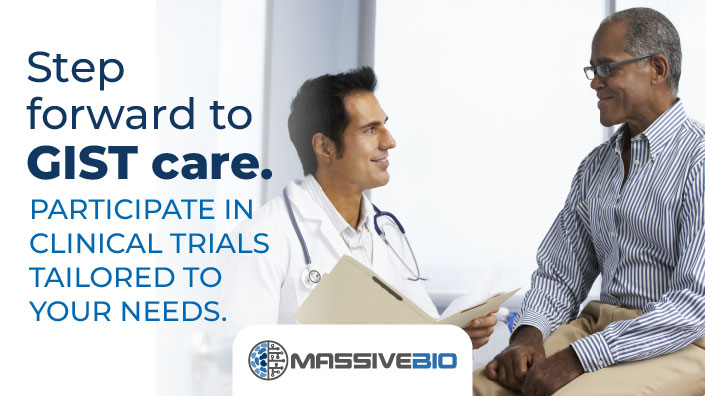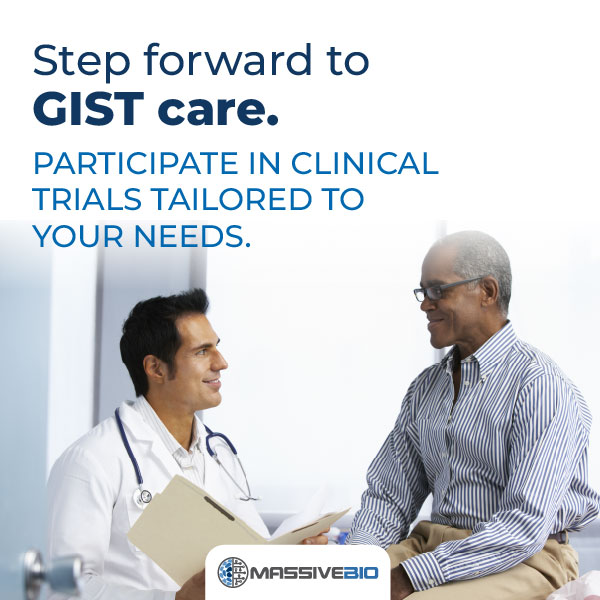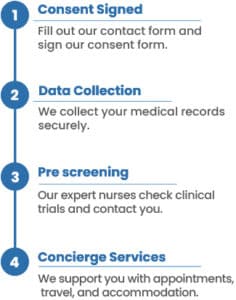News Massive Bio Has Onboarded Over 120,000 Cancer Patients To Find Their Clinical Trial
New Advances in GIST Treatments
Gastrointestinal stromal tumors (GIST) often bring up many questions, yet there's an increasing wave of hope. Our service is devoted to connecting all GIST patients, irrespective of their disease stage, with the most recent clinical trials. We offer support to everyone, from early-stage to advanced GIST patients.
Compliant with

You can receive a guidebook with information about lymphoma by filling out the form.
Latest Breakthroughs in GIST Therapy
Our aim is to help patients access a wide range of innovative medical studies, ensuring that every GIST patient can explore the latest treatment options.
Our matching system connects you with the latest clinical trials, offering new opportunities for individuals battling gastrointestinal stromal tumors. You will gain access to comprehensive information on clinical trials tailored for GIST, irrespective of the disease stage. These trials feature novel treatments not commonly available, targeting the specific biomarkers related to your GIST diagnosis. This presents a unique chance for you to actively engage in managing your health, with our dedicated guidance and support.


How our system works
We check your medical records and use our AI system to find clinical trials you can join. We also offer a concierge service to help you smoothly transition into the clinical trial.
Our team of specialized nurses and physicians will ensure that they take care of every detail of your participation in the trial before, during, and after your enrollment.
All the services provided are completely free for you and your treating oncologist.
Understanding the disease
What are Gastrointestinal Stromal Tumors (GIST)?
GIST cancer occurs in the digestive system, most commonly in the stomach or small intestine. It arises from specialized cells in the gastrointestinal tract known as the interstitial cells of Cajal, which are part of the autonomic nervous system and play a role in food digestion.
Location-based Classification:
- Stomach GIST: The most common location, accounting for about 60% of cases.
- Small Intestine GIST: Accounting for about 25-30% of cases.
- Esophagus, duodenum, colon or rectum GIST: Representing in total about 20% of cases.
- Extra gastrointestinal stromal tumors (peritoneum or omentum) EGISTs: Rare tumors representing <5%.
Symptoms of GIST:
Symptoms can vary greatly depending on the tumor’s size and location. In many cases, GISTs may not cause any symptoms until they become large. Some may include:
- Abdominal Pain or Discomfort: Often the most common symptom.
- A Palpable Mass: Feeling a lump in the abdomen.
- Gastrointestinal Bleeding: This can lead to black or tarry stools, vomiting blood, or anemia (low red blood cell count), causing fatigue and weakness.
- Nausea and Vomiting: Particularly if the tumor is causing a blockage in the stomach or intestines.
- Early Satiety: Feeling full after eating only a small amount of food.
Stages of GIST:
- Stage I: The tumor is small and not growing quickly. For tumors in the stomach or omentum, it measures between 2 and 10 cm. For tumors in the small intestine, esophagus, colon, rectum, or peritoneum, it measures between 2 and 5 cm. It has not spread to lymph nodes or other parts of the body.
- Stage II: The tumor is medium-sized. For tumors in the stomach or omentum, it measures between 5 and 10 cm and may grow slowly or quickly. For tumors in the small intestine, esophagus, colon, rectum, or peritoneum, it measures between 5 and 10 cm and grows slowly. It has not spread to lymph nodes or other parts of the body.
- Stage III: The tumor is medium or large. For tumors in the stomach or omentum, it measures larger than 5 cm and grows quickly. For tumors in the small intestine, esophagus, colon, rectum, or peritoneum, it can be any size and may grow slowly or quickly. It has not spread to lymph nodes or other parts of the body.
- Stage IV (Metastatic GIST): The tumor can be any size and grow at any rate. It has spread to lymph nodes or other parts of the body, such as the liver or the lining of the abdomen.
What does Treated and Untreated GIST mean?
- Treated GIST: Patient has received medical intervention such as surgery, targeted therapy, or chemotherapy to remove or control the tumor, improving the patient’s outcomes.
- Untreated GIST: Patient has not received any treatment. Leaving the patient untreated allows the tumor to grow and possibly spread, which can worsen symptoms and prognosis.
No matter the case, there are clinical trials designed for both treated and untreated GIST patients, offering access to potentially groundbreaking therapies.
What Does Resectable (Surgery-Eligible) and Unresectable (Not Surgery-Eligible) GIST mean?
- Resectable GIST: can be clearly removed by surgery without causing major health problems. They are usually localized and smaller, with a lower growth rate, and surgery offers the best chance for a cure.
- Unresectable GIST: Cannot be completely removed by surgery due to their size, location, or spread to other parts of the body. Treatment focuses on controlling the disease.
Clinical trials are available for both resectable and unresectable GIST. For resectable GIST, these trials focus on new surgical techniques, adjuvant therapies, and supportive treatments. For unresectable GIST, the trials explore new medications, treatment combinations, and novel therapeutic approaches.
What are the treatment options for GISTs?
Treatment options vary based on factors like the size and location of the tumor, whether it has spread, and the specific genetic mutations it carries. Here are the primary treatment options:
Surgery:
- Primary Treatment: For localized GISTs, surgery is often the first line of treatment. The goal is to remove the tumor completely.
- Advanced GISTs: Usually done when combined with targeted therapies to shrink the tumor before surgery. It may also be used to alleviate symptoms or remove isolated metastatic tumors.
Targeted Therapy:
- Commonly used targeted therapies for GIST include tyrosine kinase inhibitors (TKIs). By inhibiting these proteins, the drugs can slow or stop the tumor’s growth, which are effective against tumors with common mutations in genes like KIT or PDGFRA. Additionally, there are ongoing clinical trials focused on developing new targeted therapies and lines of treatment for GIST.
Radiation Therapy:
- Less commonly used for GISTs but may be considered in certain situations, such as to relieve symptoms or if surgery and targeted therapies are not options.
Chemotherapy:
- Traditional chemotherapy is generally not effective against GISTs, but in some cases, it might be tried.
Clinical Trials:
- Patients are encouraged to consider clinical trials, which can provide access to new treatments not yet widely available.
GIST genetic mutations and Clinical Trials
Genetic mutations in GIST are identified using several diagnostic tests and techniques, primarily focused on detecting alterations in the KIT and PDGFRA genes which are crucial for guiding treatment decisions using targeted therapies. The main methods to identify these mutations include:
Immunohistochemistry (IHC):
- Is a laboratory technique used to detect specific proteins in tissue samples by using antibodies. IHC doesn’t directly detect genetic mutations but identifies proteins that are strong indicators of genetic mutations.
In GIST tumors some common markers are
- CD117 protein: approximately 95% of GISTs are positive for this protein suggesting a genetic mutation on the KIT gene.
- DOG1: Supports GIST diagnosis, especially if CD117 is negative.
- SDHB: Loss indicates SDH-deficient GISTs.
- CD140a: Suggest a mutation in PDGFRA gene which is usually identified through genetic testing.
Next-generation sequencing (NGS)
Used to determine the sequence of DNA or RNA. It allows for the rapid and accurate analysis of genetic mutations. In GIST it is used to identify the specific type and location of mutations in the following genes:
- KIT Mutations: Commonly found in exons 9, 11, 13, 17 and 18.
- PDGFRA Mutations: Notably in exon 18, with D842V being a key example.
- SDH (Succinate Dehydrogenase) Mutations: Found in SDH-deficient GISTs.
- RAS/RAF Pathway Mutations: Present in some wild-type GISTs.
- NF1 (Neurofibromatosis Type 1) Mutations: Occur in GISTs associated with Neurofibromatosis Type 1.
- Wild-type or non-mutated GIST: A less common mutation profile for GIST tumors.
New hope is on the horizon for GIST tumor cancer patients, as most clinical trials are now focused on targeting the KIT and PDGFRA mutations, paving the way for more effective and personalized treatments.
The Role of GIST Clinical Trials
Clinical trials are vital in the treatment of this disease for several reasons:
1. Access to Innovative Treatments: Clinical trials provide patients the opportunity to try novel treatments that may be more effective, particularly important when standard treatments have limited effectiveness.
2. Enhancing Patient Outcomes: Participation in clinical trials contributes to the collective understanding, potentially improving survival rates and life quality for future GIST patients.
3. Comprehensive and Focused Care: Patients in clinical trials receive attentive care and are closely monitored by specialized healthcare professionals and researchers, ensuring thorough treatment management.
4. Offering Hope: For GIST patients, especially those exploring all treatment options, clinical trials offer a sense of hope — for their own prognosis and the prospect of aiding future patients through their participation.
5. Advancing GIST Research: These trials are crucial in advancing scientific knowledge about GIST, shedding light on the efficacy of new treatments and identifying those most likely to benefit from them. This research is instrumental in developing more tailored and effective treatment strategies.
We combine the power of technology with our dedicated team of medical providers to find you the best treatment options available.
Access the free matching toolA GIST Clinical Trial May Be an Option for You


Massive Bio offers a quick, easy, and FREE way to find clinical trials for patients like you. With our unique clinical trial matching system and compassionate team, Massive Bio can rapidly match you to GIST clinical trials.
Talk to us. Our nurses and patient relations coordinators are here and happy to help you. You are not alone in this fight.
Call +1 844 627 7246What is a Mantle Cell Lymphoma clinical trial?
Clinical trials test the latest scientific advancements in Mantle Cell Lymphoma treatment. Patients who choose to enroll in trials can receive cutting-edge treatment and high-quality care under the direction of scientists, doctors, and researchers. Mantle Cell Lymphoma patients might gain access to promising drugs and innovative treatments long before they're made available to the public.
You are not alone
You can have an experienced team with you
What Are Clinical Trials?
Cancer is an unfortunate reality that touches most of us at some point in our lives. If you or a loved one has cancer, you may have heard or read that clinical trials could offer access to innovative new treatments. But what exactly is a clinical trial? In this video, Massive Bio co-founder Arturo Loaiza-Bonilla, MD, explains how clinical trials work, what to expect if you enroll in one, and why a clinical trial can be an important treatment option for many cancer patients.
We dream of the day when cancer disappears from our lives. Massive Bio is working tirelessly on achieving that goal.
-
Why should I trust Massive Bio?
Why should I trust Massive Bio?
Massive Bio has provided health to more than 120,000 cancer patients in 25 countries across three continents. It collaborates with over 80 global partners. In 2022, Massive Bio became part of the Precision Cancer Consortium (PCC), alongside major companies such as AstraZeneca, Bayer, Eli Lilly & Company, GSK, Johnson & Johnson/Janssen, Novartis and Roche.
-
What is the process?
What is the process?
To find the best clinical research studies for you, we need your medical history and consent. You can provide this consent by filling out the form on this page and the following pages. Once you’ve done that, our patient relations coordinator will contact you to discuss the details and provide further information for clinical research matching report.
-
Why do I have to provide my medical records to enroll in a clinical trial?
Why do I have to provide my medical records to enroll in a clinical trial?
To enroll in clinical trial, you must meet highly specific criteria that’s established by the researchers who are conducting the investigation. That includes detailed information about type of cancer, treatment history, response to treatment, and other data that is collected in medical records.
-
What should I do if I don’t have my medical records?
What should I do if I don’t have my medical records?
If you are being treated for cancer or any other disease, your doctor should have a complete record of your medical care, including specific information about what form of the disease you have and what treatments you have received. Your patient relations coordinator will contact you and inform you about the details.
-
What are the costs associated with Massive Bio’s services?
What are the costs associated with Massive Bio’s services?
Massive Bio provides its services to the patients and their doctors at no cost—you won’t have to pay anything to receive a clinical-research matching report. There are no hidden costs involved.
-
How does Massive Bio protect my personal information?
How does Massive Bio protect my personal information?
Massive Bio strictly adheres to all HIPAA guidelines and international regulations focused on maintaining your privacy. We take extra measures to secure your personal information, ensuring it is protected beyond the mandatory requirements.
-
Where can I find clinical research studies in my area?
Where can I find clinical research studies in my area?
Your doctor may know of a clinical research study being conducted in your area that’s recruiting participants and is right for you. However, Massive Bio uses its artificial intelligence-powered platform to match patients to clinical research studies of treatments that give you the best chance of a positive outcome and are being conducted in a geographical location that makes sense for you.
-
Can I continue seeing my doctor or oncologist while also taking services of Massive Bio?
Can I continue seeing my doctor or oncologist while also taking services of Massive Bio?
Yes, Massive Bio keeps your doctor up to date on your status throughout your participation.






